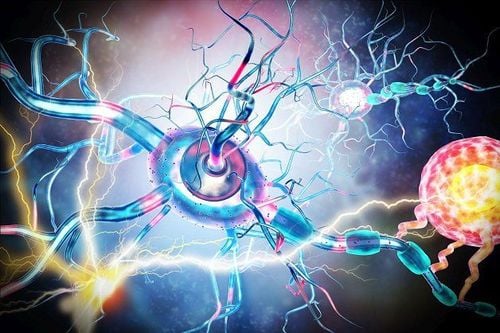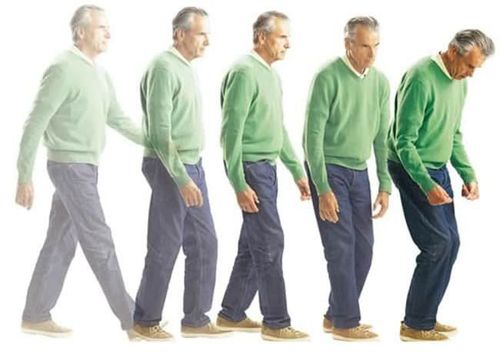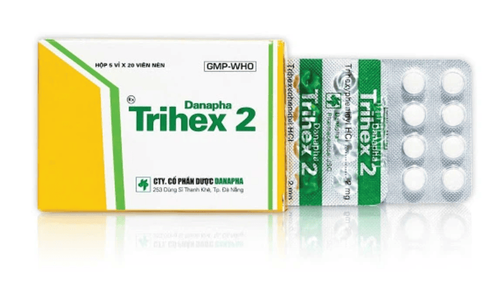This is an automatically translated article.
Most people with extrapyramidal syndrome are due to degeneration or damage of extrapyramidal system neurons because of conditions such as vascular disorders, sequelae of trauma or anemia brain, side effects of some drugs, frequent exposure to chemicals or patients with neurological diseases.
1. Learn about extrapyramidal syndrome
The extrapyramidal system is a group of gray nucleus neurons at the base of the brain, the extrapyramidal system will work with the cerebellum to affect the brain cells in the motor area for the purpose of controlling movements. as the body's muscle tone regulation. Therefore, any cause of extrapyramidal damage can lead to peripheral motor disturbances. These peripheral movement disorders include tremors, muscle stiffness, chorea, or slow walking...
However, the majority of people with extrapyramidal syndromes are due to degeneration or damage Injury of extrapyramidal system neurons due to the following diseases:
Due to vascular disorders: The most typical vascular disorders are arteriosclerosis, cerebral infarction, vasculitis or hemorrhage. cerebral blood flow; After trauma or cerebral ischemia: The sequelae after trauma, surgery or chronic ischemic conditions in long-term hypertension, cervical spondylosis.. can cause extrapyramidal syndrome. Side effects of certain medications: There are certain medications such as antipsychotics, antihistamines or the antiemetic metoclopramide that can cause side effects, which in turn lead to this syndrome. Frequent exposure to chemicals: Pesticides, heavy metals such as mercury and lead, toxic chemicals or copper metabolism disorders, brain infections... are also some of the causes. this syndrome. People with neurological diseases such as: Huntington's disease, damage to the hypothalamus or epilepsy ...

Hệ thống ngoại tháp là một tập hợp nhóm tế bào thần kinh nhân xám tại vị trí đáy não
2. Symptoms of extrapyramidal syndrome
Extrapyramidal syndrome has 4 main symptoms. The main symptom types are Parkinson's symptom, Dystonia symptom (dystonic dystonia), Akathisia (restlessness) and Tardive dyskinesia (chorea). Signs of those symptoms include:
2.1. Parkinson's symptoms Parkinson's symptoms include symptoms of dyskinesia similar to those in Parkinson's disease, so it is often referred to as extrapyramidal Parkinson's syndrome. Parkinson's symptoms include:
Tremor and difficulty balancing: Tremor is most common in the hands but can also occur in the muscles of the mouth leading to tremors in the lips. In addition, people with this extrapyramidal syndrome often have a lot of difficulty in balancing, so it is difficult to stand. Stiffness: The muscles and joints in the limbs are stiff, so it is often difficult for the patient to function and move. Slow movement: Slow movement is often caused by stiff muscles, which causes slow movement, difficulty swallowing, difficulty speaking as well as difficulty expressing emotions. 2.2 Dystonia symptoms (dystonic dystonia) Dystonia symptoms, also known as Dystonic reactions, is a condition in which the patient's upper body suddenly becomes completely stiff, resulting in a feeling of difficulty. suffer, upset, and cause pain.
Dystonia symptoms can affect all muscles in the body, including the neck muscles (causing torticollis), eye muscles, tongue muscles, jaw muscles or respiratory muscles causing make it difficult for the patient to breathe.
2.3 Akathisia symptom (restlessness) Akathisia symptom is also known as restlessness symptom. This symptom often makes the patient feel restless and uncomfortable when sitting still, thus forcing the patient to move constantly.
Besides, Akathisia symptoms can also make the patient always feel anxious and unable to relax comfortably, severely affected psychologically.
2.4. Tardive movement disorder (chorea) This is a symptom that causes the patient to have sudden, rapid, jerky and irregular movements of other parts of the body. These symptoms are common in the face, neck, lips, tongue, and hands and feet.
However, these symptoms tend to appear months or years after antipsychotic use.

Rối loạn vận động Tardive là triệu chứng của hội chứng ngoại tháp
3. Treatment of extrapyramidal syndrome
The treatment of extrapyramidal syndrome will usually depend on the cause of the disease as well as the symptoms that the patient is experiencing. In case, if you are using drugs that cause extrapyramidal syndrome, it is necessary to reduce the dose and replace with other drugs. And the symptoms of extrapyramidal syndrome are usually treated with the following drugs:
Drugs for Parkinson's syndrome: The drug that can be used to treat Parkinson's syndrome is an anticholinergic drug. When using this drug should start with the lowest dose until the patient's body can respond. After the symptoms have subsided, the dose can be gradually reduced and the drug discontinued. Drugs for Akathisia: For akathisia-type extrapyramidal dyskinesia, the first choice is usually low-dose propranolol or benzodiazepines, which are also effective. Dystonia Symptom Treatment: Dystonic is a medical emergency, so when experiencing symptoms of Dystonia, the patient should be taken to a medical facility as soon as possible. Dystonia symptoms can be treated by intramuscular injection of an anticholinergic drug, eg benztropine 1-2mg, repeated 15-30 minutes until symptoms are no longer present. Tardive dyskinesia: This is a very difficult disorder to treat, so the best treatment for tardive dyskinesia is prevention. Prevention is to choose antipsychotic drugs with the lowest anti-dopamine activity in the early stages. Where Tardive disorder is present, the mainstay of treatment is to switch existing antipsychotics to those with less risk.
4. Attention when treating extrapyramidal syndrome
When there is extrapyramidal syndrome, some patients can recover on their own after stopping antipsychotic medication or changing to some other drug that causes fewer side effects. However, in most other cases, complete cure of extrapyramidal syndrome is difficult to achieve. Therefore, in order to improve the condition effectively as well as long-term, the patient needs to fully implement the following measures:
Depending on the specific causes and symptoms, the doctor will prescribe appropriate treatment drugs. Suitable for patients, the drugs can be anticholinergic drugs, tranquilizers, botox injections... Therefore, when using these drugs, patients should be aware of the unwanted effects of the drug. Therefore, try to take the right dose of medicine as well as visit your doctor regularly so that the doctor can adjust the dose in time. Supplementing with many minerals, vitamins and omega-3 through the diet such as green leafy vegetables, fruits, sea fish, whole grains... Increase physical activity to increase flexibility as well as ingenuity muscle dexterity, thereby helping blood circulation better, improving limb tremors, muscle spasms or twists caused by extrapyramidal syndromes. At the same time, it is necessary to relax mentally and relax by reducing anxiety, stabilizing psychology to prevent the progression of extrapyramidal syndrome. In short, when being diagnosed with extrapyramidal syndrome, the patient should not be too worried. Instead, take treatments to improve symptoms. As long as the patient perseveres, tries to combine medication and lifestyle changes, this disease will soon be reversed.
In addition, if you are not sure about the disease, you can go to a reputable hospital to be examined by a specialist and come up with the most appropriate treatment regimen. Currently, Vinmec International General Hospital is one of the leading prestigious hospitals in the country, trusted by a large number of patients for medical examination and treatment. Not only the physical system, modern equipment: 6 ultrasound rooms, 4 DR X-ray rooms (1 full-axis machine, 1 light machine, 1 general machine and 1 mammography machine) , 2 DR portable X-ray machines, 2 multi-row CT scanner rooms (1 128 rows and 1 16 arrays), 2 Magnetic resonance imaging rooms (1 3 Tesla and 1 1.5 Tesla), 1 room for 2 levels of interventional angiography and 1 room to measure bone mineral density.... Vinmec is also the place to gather a team of experienced doctors and nurses who will greatly assist in diagnosis and detection. early signs of abnormality in the patient's body. In particular, with a space designed according to 5-star hotel standards, Vinmec ensures to bring the patient the most comfort, friendliness and peace of mind.
Please dial HOTLINE for more information or register for an appointment HERE. Download MyVinmec app to make appointments faster and to manage your bookings easily.













